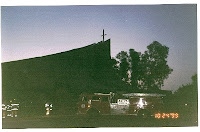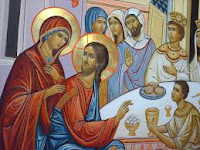There is another important factor in the study of relationships: the spiritual attitudes and training, if any, that we grow up with. My parents were solid Christians going back several generations, and most of the people in the family were committed to Biblical values and teachings, for which I am very grateful. Most of our friends were church people, as well, and pretty decent folks, with their own quirks. There was one guy, a year older, that I was good friends with since childhood, and my dad had high hopes for a relationship with me. It almost happened, but when we were in college, I noticed that his conversation and values were not what they had been, and this wasn't going to work. I've been in occasional touch with him over the years, and he has no interest in anything spiritual. I still pray for him.
My husband, although he had grown up a half-world away, had been raised in Protestant mission schools. He had surprisingly similar values to my family, and one of his brothers was an Arabic-language evangelist with American Bible school training. I might say there is some baggage with some of his family, there is some alcoholism and a lot of drama with my inlaws, although most of it worked itself out during my mother-in-law's final illness. It was amazing to see how real life-and-death reality brought closure to a lot of assorted baggage!

One of the most dramatic loads of baggage I've helped deal with over the past 20 years is the story of Calvary/NorthPoint, now Sandals San Bernardino. There was a major sanctuary fire at the end of 1999, then our insurance company went into liquidation after 9/11 in 2001. We were in the middle of the sanctuary rebuild at that point, and too far into it to walk away. We did fundraisers, and took out a loan with our credit union (their loan guy told me that he'd never walked into a loan application meeting with as high a faith factor as we had). We had a Christian school on campus at the time, but it developed financial problems, not helped with the 2008 market crash and the exodus of folks from San Bernardino, and we had to close it. It reached a point where we rented out the property to The Way World Outreach for five years and held our services at the Elks Lodge. When The Way moved out to their new facility, we had no choice but to come back and do what we could to repair the facility and rebuild our church family. This was a huge, huge load of baggage, and as church treasurer through all this, I got a great lesson in faith! When we were approached by Sandals Church with the offer to merge with their organization, we saw God work in amazing ways,and it's still going on. Sandals has really saved our lives as a body of Christ, and we are incredibly grateful and looking forward to seeing the kind of impact that our original founders were hoping for--and more!



